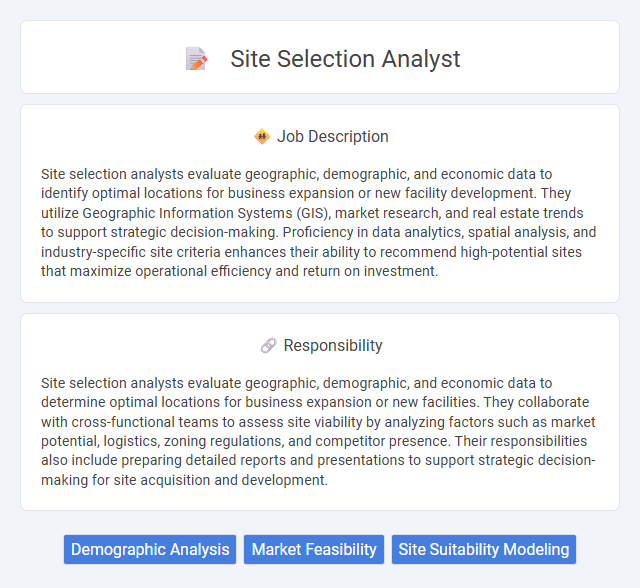
Site selection analysts evaluate geographic, demographic, and economic data to identify optimal locations for business expansion or new facility development. They utilize Geographic Information Systems (GIS), market research, and real estate trends to support strategic decision-making. Proficiency in data analytics, spatial analysis, and industry-specific site criteria enhances their ability to recommend high-potential sites that maximize operational efficiency and return on investment.
Candidates with strong analytical skills and a keen attention to detail are likely to thrive as site selection analysts, as the role involves evaluating geographic, economic, and demographic data to determine optimal locations for business expansion. Individuals who enjoy working with data, possess critical thinking abilities, and are comfortable making recommendations based on complex variables will probably find this job well-suited to their strengths. Conversely, those who struggle with data analysis or prefer more interpersonal roles might have difficulty adapting to the demands of this position.
Qualification
A Site Selection Analyst requires a strong background in data analysis, geography, and market research, often holding a degree in economics, urban planning, or business administration. Proficiency in GIS software, statistical tools, and advanced Excel skills is essential for evaluating demographic trends, economic indicators, and competitive landscapes. Critical thinking, attention to detail, and excellent communication abilities are vital to present actionable insights for strategic location decisions.
Responsibility
Site selection analysts evaluate geographic, demographic, and economic data to determine optimal locations for business expansion or new facilities. They collaborate with cross-functional teams to assess site viability by analyzing factors such as market potential, logistics, zoning regulations, and competitor presence. Their responsibilities also include preparing detailed reports and presentations to support strategic decision-making for site acquisition and development.
Benefit
Site selection analysts likely improve business outcomes by identifying optimal locations that enhance market reach and operational efficiency. Their expertise may reduce costs through strategic analysis of demographic, economic, and geographic data, increasing the probability of successful investments. Employers could gain competitive advantages as these analysts help predict long-term growth potential and mitigate location-related risks.
Challenge
Site selection analyst roles often involve navigating complex data sets to identify optimal locations, which can present significant challenges due to fluctuating market conditions and diverse regulatory environments. The probability of encountering conflicting data or unexpected site limitations requires strong problem-solving skills and adaptability. Analysts may frequently face pressure to balance economic, geographic, and demographic factors while delivering timely recommendations.
Career Advancement
Site selection analysts play a critical role in identifying optimal locations for business expansion, leveraging data on demographics, market trends, and geographic factors to guide strategic decisions. Career advancement in this field often leads to senior analyst positions, project management roles, or director-level responsibilities in real estate and corporate strategy departments. Mastery of geographic information systems (GIS), market analysis, and negotiation skills significantly enhances promotion prospects and leadership opportunities.
Key Terms
Demographic Analysis
Site selection analysts leverage advanced demographic analysis to identify optimal locations for business expansion, utilizing data on population density, age distribution, income levels, and consumer behavior patterns. They integrate geographic information systems (GIS) with census data and market research to forecast potential customer base and ensure alignment with target market profiles. This precise demographic insight supports strategic decision-making, minimizes risk, and maximizes return on investment in new site developments.
Market Feasibility
A Site Selection Analyst specializing in Market Feasibility evaluates potential locations by analyzing demographic trends, consumer behavior, and economic conditions to determine optimal sites for business expansion or retail development. They utilize geographic information systems (GIS), market data, and competitive landscape assessments to forecast revenue potential and operational viability. Expertise in market demand forecasting and spatial analysis drives data-driven decisions that minimize risk and maximize site profitability.
Site Suitability Modeling
Site selection analysts utilize site suitability modeling to evaluate geographic and demographic data, optimizing decisions for retail, industrial, or commercial location placement. By integrating GIS technology, market trends, zoning laws, and infrastructure variables, they identify optimal sites that maximize profitability and operational efficiency. Advanced predictive analytics and spatial analysis tools enhance accuracy in forecasting site performance and mitigating risks associated with location choices.
 kuljobs.com
kuljobs.com